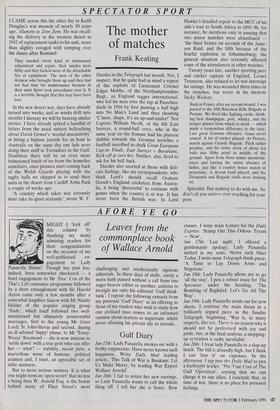SPECTATOR SPORT
I CAME across this the other day in Keith Douglas's war memoir of nearly 50 years ago, Alamein to Zem Zem. He was recall- ing the delivery in the western desert in 1942 of replacement tanks to his unit, more than slightly ravaged with romping over the dunes after Rommel:
They needed every kind of elementary adjustment and repair, their insides were filthy and they lacked most of the detachable bits of equipment. The men of the other division who brought them up said they had not had time for maintenance because in their units Sport took precedence over it. It is a horrible thought that this may have been true.
In the new desert war, days have already turned into weeks, and as weeks drift into months I daresay we will be hearing similar stories. I have already spiked a handful of letters from the usual nutters bellyaching about David Gower's 'woeful insensitivity' at hiring a biplane joyride for an hour in Australia on the same day our lads were doing their stuff in Tornadoes in the Gulf. Doubtless there will he an even more brimstoned batch of ire from the homefire armchairs, once pictures start coming back of the Welsh Guards playing with the rugby balls we chipped in to send their units in the desert from Cardiff Arms Park a couple of weeks ago. `A country which takes war seriously must take its sport seriously', wrote W. F.
The mother of matches
Frank Keating
Deedes in the Telegraph last month. Not, I suspect, that he quite had in mind a repeat of the exploits of Lieutenant Colonel Edgar Mobbs, of the Northamptonshire Regt., an England rugger international, who led his men over the top at Passchen- daele in 1916 by first punting a ball high into No Man's Land and then shouting `Cmon, chaps, it's an up-and-under!' Nor Captain William Nevill, of the 8th East Surreys, a round-ball cove, who in the same year on the Somme had his platoon dribble towards the German trenches a football inscribed in chalk Great European Cup-tie Finals, East Surreys v Bavarians, Kick-off at zero hrs. Neither, alas, lived to ask for his ball back.
Deedes also snorted at those with deli- cate feelings, like my correspondents, who think Lord's should recall Graham Gooch's England cricketers from Austra- lia, it being 'distasteful' to continue with games when the country is at war. It has never been the British way. In Lord Hawke's detailed report to the MCC of his side's tour to South Africa in 1895-96, for instance, he mentions only in passing that two minor matches were abandoned 'the third fixture on account of the Jame- son Raid, and the fifth because of the fearful explosion in Johannesburg; the general situation also seriously affected some of the attendances at other matches.'
Twenty years late, another sporting peer and cricket captain of England, Lionel Tennyson, also refused to let war interrupt his innings. He was wounded three times in the trenches, but wrote in his memoir Sticky Wickets:
Back in France after my second wound, I was posted to the 10th Battalion Rifle Brigade at Pernais. We lived like fighting cocks, drink- ing best champagne, port, whisky, and the proper glasses from which to drink — which made a tremendous difference to the taste. Last great German offensive. Guns never ceased. A lot of cricket played. At Proven, match against Guards Brigade. Pitch rather peculiar, and hit entire stock of about ten balls into filthy pond in middle of the ground. Apart from those minor inconveni- ences and barring the entire absence of ladies, just like a country house match in peacetime. A decent band played, and the Divisional and Brigade staffs were looking on.
Splendid. But nothing to do with me. So don't all you nutters start reaching for your pens.


















































 Previous page
Previous page